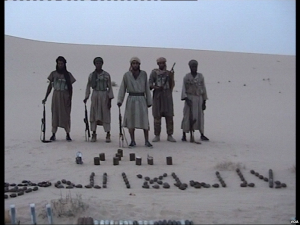The emergence of a new Battleground in the fight against Islamic Militants
While the recent developments in Mali may lead to peace between the Malian government and the Tuareg-led rebels, the presence of Al-Qaeda in the Islamic Maghreb must be addressed strongly to prevent violence in other countries. The rise of Islamic terrorism or insurgencies in sub-Saharan Africa can be vaguely attributed to instability from territorial disputes or ethnic tensions. As we have seen the threat to territorial integrity and human rights posed by the Islamic State in Iraq and the Levant, a key part of the strategy to address similar insurgencies is to contain terrorism in countries such as Mali.

Often in discussions on violent Islamic extremism, the Middle East is described as the epicenter of the terrorism and insurgencies that follow such ideologies; however, northern and western Africa have developed into vital battlegrounds in the fight against Islamic militants. Combined with the ongoing conflict in northern Mali, the widespread atrocities of Boko Haram in West Africa indicate the threat that similar terrorist groups pose to the continent. The most frightening aspect of the emergence of groups such as Ansar Dine, Al-Qaeda in the Islamic Maghreb (AQIM), the various militias operating in Libya, and Boko Haram in Africa, is the interconnectedness of the militant groups. While these connections may initially seem dangerous, the international community’s understanding of them could be the key to stability in the region.
Like most active radical Islamic terrorist organizations, the groups currently active on the African continent can be traced back to the Salafist ideology that materialized in armed groups in the late 1990s and early 2000s. The Armed Islamic Group of Algeria (GIA), for example, existed as the precursor to Al-Qaeda in the Islamic Maghreb which began under the name of the Salafist Group for Preaching and Combat (GSPC). Boko Haram also emerged from the Salafist ideology in 2002 before it began to gain large swaths of Nigerian territory in the past two years. Both AQIM and Al-Shabaab, a terrorist group that operates in both Somalia and Kenya, are linked directly to Al-Qaeda, which became the target of the United States and its allies after the 9/11 attacks. Despite efforts to neutralize the terrorist organization over the past decade, related groups like Al-Shabaab and Boko Haram continue to expand their influence.
A common theme in the rise of terrorist organizations like AQIM and Boko Haram is the already existing social or territorial issues in Mali and Nigeria. In Mali, AQIM capitalized on the Tuareg rebellion of 2012 to establish their presence there. The initial rebellion was led by members of the National Movement for the Liberation of Azawad (MNLA), members of the Tuareg minority. Although the separatist group’s alliance with Islamist groups like Ansar Dine allowed for the coup d’etat against President Amadou Toumani Toure, Islamic militants quickly gained a foothold in the Northern Mali.
Religious violence in Nigeria became the vehicle for Boko Haram’s rise to power. Although conflicts between Muslims and Christians has existed since Nigeria’s independence, the Nigerian Security Forces’ crackdown on the organization in 2009 led to the continuing Islamic insurgency. Just like that of the militants in northern Mali-- and insurgents in Iraq and Syria-- the goal of Boko Haram is to establish a region governed by Islamic law. While twelve majority Muslim states in Nigeria already implement Sharia in their judicial systems, Boko Haram intends to extend such rule.
The recent activities of Boko Haram in Cameroon exemplify the need to address the expansion of Islamic militants in sub-Saharan Africa. While the fight against Islamic terrorism in the Middle East has been spearheaded by the United States, its NATO allies, and the Gulf states, other alliances must be responsible for preventing the growth of Islamic insurgencies in Africa. So far, efforts by the United Nations and the African Union have been somewhat successful in addressing the insurgencies in Mali and Nigeria. The UN Multidimensional Integrated Stabilization Mission in Mali (MINUSMA) has worked well with French forces to achieve peace between the Malian government and the insurgents. African Union forces from Chad, Ghana, Nigeria, Cameroon and Benin have also engaged Boko Haram in Cameroon.
Although the UN, AU, and French forces have all proven to be willing to face the Islamic militants in West Africa, more must be done to diminish the connections between militants across the continent. Already it has been seen that arms from Tuareg militants in Libya have reached those in Mali;and Al-Shabaab has also received funding from groups outside Somalia. Formally tackling the connections between Islamist groups in Africa is the next step in preventing a major Islamic insurgency such as that in the Middle East.
